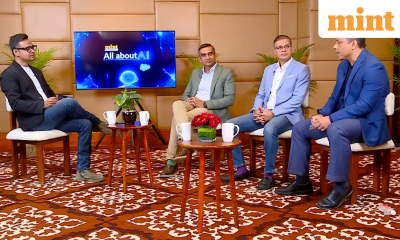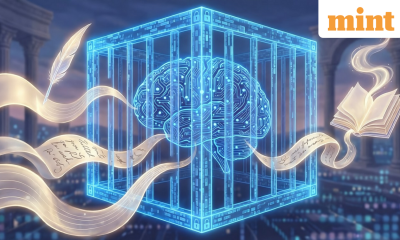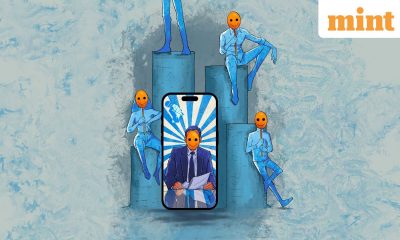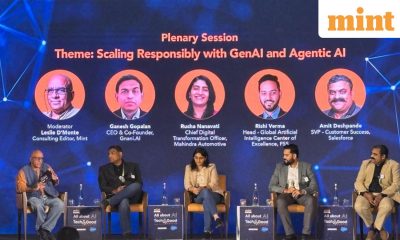

Metaverse
Yuval Noah Harari argues that AI has hacked the operating system of human civilization – Crypto News
Fears of artificial intelligence (AI) have haunted humanity since the very beginning of the computer age. Hitherto these fears focused on machines using physical means to kill, enslave or replace people. But over the past couple of years new AI tools have emerged that threaten the survival of human civilization from an unexpected direction. AI has gained some remarkable abilities to manipulate and generate language, whether with words, sounds or images. AI has thereby hacked the operating system of our civilization.
Language is the stuff almost all human culture is made of. Human rights, for example, aren’t inscribed in our DNA. Rather, they are cultural artefacts we created by telling stories and writing laws. Gods aren’t physical realities. Rather, they are cultural artefacts we created by inventing myths and writing scriptures.
Money, too, is a cultural artefact. Banknotes are just colorful pieces of paper, and at present more than 90% of money is not even banknotes—it is just digital information in computers. What gives money value is the stories that bankers, finance ministers and cryptocurrency gurus tell us about it. Sam Bankman-Fried, Elizabeth Holmes and Bernie Madoff were not particularly good at creating real value, but they were all extremely capable storytellers.
What would happen once a non-human intelligence becomes better than the average human at telling stories, composing melodies, drawing images, and writing laws and scriptures? When people think about ChatGPT and other new AI tools, they are often drawn to examples like school children using AI to write their essays. What will happen to the school system when kids do that? But this kind of question misses the bigger picture. Forget about school essays. Think of the next American presidential race in 2024, and try to imagine the impact of AI tools that can be made to mass-produce political content, fake-news stories and scriptures for new cults.
In recent years the QAnon cult has coalesced around anonymous online messages, known as “Q drops”. Followers collected, revered and interpreted these Q drops as a sacred text. While to the best of our knowledge all previous Q drops were composed by humans, and bots merely helped disseminate them, in future we might see the first cults in history whose revered texts were written by a non-human intelligence. Religions throughout history have claimed a non-human source for their holy books. Soon that might be a reality .
On a more prosaic level, we might soon find ourselves conducting lengthy online discussions about abortion, climate change or the Russian invasion of Ukraine with entities that we think are humans—but are actually AI. The catch is that it is utterly pointless for us to spend time trying to change the declared opinions of an AI bot, while the AI could hone its messages so precisely that it stands a good chance of influencing us.
Through its mastery of language, AI could even form intimate relationships with people, and use the power of intimacy to change our opinions and worldviews. Although there is no indication that AI has any consciousness or feelings of its own, to foster fake intimacy with humans it is enough if the AI can make them feel emotionally attached to it. In June 2022 Blake Lemoine, a Google engineer, publicly claimed that the AI chatbot LaMDA, on which he was working, had become sentient. The controversial claim cost him his job. The most interesting thing about this episode was not Mr. Lemoine’s claim, which was probably false. Rather, it was his willingness to risk his lucrative job for the sake of the AI chatbot. If AI can influence people to risk their jobs for it, what else could it induce them to do?
In a political battle for minds and hearts, intimacy is the most efficient weapon, and AI has just gained the ability to mass-produce intimate relationships with millions of people. We all know that over the past decade social media has become a battleground for controlling human attention. With the new generation of AI, the battlefront is shifting from attention to intimacy. What will happen to human society and human psychology as AI fights AI in a battle to fake intimate relationships with us, which can then be used to convince us to vote for particular politicians or buy particular products?
Even without creating “fake intimacy”, the new AI tools would have an immense influence on our opinions and worldviews. People may come to use a single AI advisor as a one-stop, all-knowing oracle. No wonder Google is terrified. Why why read a newspaper when I can just ask the oracle to tell me the latest news? And what’s the purpose of advertisements, when I can just ask the oracle to tell me what to buy?
And even these scenarios don’t really capture the big picture. What we are talking about is potentially the end of human history. Not the end of history, just the end of its human-dominated part. History is the interaction between biology and culture; between our biological needs and desires for things like food and sex, and our cultural creations like religions and laws. History is the process through which laws and religions shape food and sex.
What will happen to the course of history when AI takes over culture, and begins producing stories, melodies, laws and religions? Previous tools like the printing press and radio helped spread the cultural ideas of humans, but they never created new cultural ideas of their own. AI is fundamentally different. AI can create completely new ideas, completely new culture.
At first, AI will probably imitate the human prototypes that it was trained on in its infancy. But with each passing year, AI culture will boldly go where no human has gone before. For millennia human beings have lived inside the dreams of other humans. In the coming decades we might find ourselves living inside the dreams of an alien intelligence.
Fear of AI has haunted mankind for only the past few decades. But for thousands of years humans have been haunted by a much deeper fear. We have always appreciated the power of stories and images to manipulate our minds and to create illusions. Consequently, since ancient times humans have feared being trapped in a world of illusions.
In the 17th century René Descartes feared that perhaps a malicious demon was trapping him inside a world of illusions, creating everything he saw and heard. In ancient Greece Plato told the famous Allegory of the Cave, in which a group of people are chained inside a cave all their lives, facing a blank wall. To install a screen. On that screen they see various shadows projected. The prisoners mistake the illusions they see there for reality.
In ancient India Buddhist and Hindu sages pointed out that all humans lived trapped inside Maya—the world of illusions. What we normally take to be reality is often just fictions in our own minds. People may wage entire wars, killing others and willing to be killed themselves, because of their belief in this or that illusion.
The AI revolution is bringing us face to face with Descartes’ demon, with Plato’s cave, with the Maya. If we are not careful, we might be trapped behind a curtain of illusions, which we could not tear away—or even realize is there.
Of course, the new power of AI could be used for good purposes as well. I won’t dwell on this, because the people who develop AI talk about it enough. The job of historians and philosophers like myself is to point out the dangers. But certainly, AI can help us in countless ways, from finding new cures for cancer to discovering solutions to the ecological crisis. The question we face is how to make sure the new AI tools are used for good rather than for ill. To do that, we first need to appreciate the true capabilities of these tools.
Since 1945 we have known that nuclear technology could generate cheap energy for the benefit of humans—but could also physically destroy human civilization. We therefore reshaped the entire international order to protect humanity, and to make sure nuclear technology was used primarily for good. We now have to grapple with a new weapon of mass destruction that can annihilate our mental and social world.
We can still regulate the new AI tools, but we must act quickly. Whereas nukes cannot invent more powerful nukes, AI can make exponentially more powerful AI. The first crucial step is to demand rigorous security checks before powerful AI tools are released into the public domain. Just as a pharmaceutical company cannot release new drugs before testing both their short-term and long-term side-effects, so tech companies shouldn’t release new AI tools before they are made safe. We need an equivalent of the Food and Drug Administration for new technology, and we need it yesterday.
Won’t slowing down public deployments of AI cause democracies to lag behind more ruthless authoritarian regimes? Just the opposite. Unregulated AI deployments would create social chaos, which would benefit autocrats and ruin democracies. Democracy is a conversation, and conversations rely on language. When AI hacks language, it could destroy our ability to have meaningful conversations, thereby destroying democracy.
We have just encountered an alien intelligence here on Earth. We don’t know much about it, except that it might destroy our civilization. We should put a halt to the irresponsible deployment of AI tools in the public sphere, and regulate AI before it regulates us. And the first regulation I would suggest is to make it mandatory for AI to disclose that it is an AI. If I am having a conversation with someone, and I cannot tell whether it is a human or an AI—that’s the end of democracy.
This text has been generated by a human.
Or has it?
Yuval Noah Harari is a historian, philosopher and author of “Sapiens”, “Homo Deus” and the children’s series “Unstoppable Us”. He is a lecturer in the Hebrew University of Jerusalem’s history department and co-founder of Sapienship, a social- impactcompany.
© 2023, The Economist Newspaper Limited. All rights reserved. From The Economist, published under license. The original content can be found on www.economist.com
Catch all the business news, market news, breaking news Events and Latest News Updates on Live Mint. Download Mint News App to get Daily Market Updates.
Updated: 12 Jun 2023, 12:47 PM IST
-

 Blockchain1 week ago
Blockchain1 week agoKlarna Debuts First Stablecoin, KlarnaUSD, on Tempo Blockchain – Crypto News
-

 Blockchain7 days ago
Blockchain7 days agoBitcoin Rises Above $90,000 as Investors Expect Interest Rate Cuts – Crypto News
-

 Blockchain1 week ago
Blockchain1 week agoMacroeconomic Pressures, Legislative Slowdown Drive Bitcoin Price Decline – Crypto News
-

 others1 week ago
others1 week agoNew Zealand’s RBNZ set to trim interest rate to 2.25% in November – Crypto News
-

 Cryptocurrency1 week ago
Cryptocurrency1 week agoFirst signs of Ethena’s recovery? ENA aligns for possible macro breakout – Crypto News
-

 Cryptocurrency6 days ago
Cryptocurrency6 days agoBitcoin price prediction: Can a bear trap help push BTC to $100K? – Crypto News
-

 Blockchain4 days ago
Blockchain4 days agoEther Eyeing $3.2K As Stablecoin Yields Remain Low: Santiment – Crypto News
-

 Technology2 days ago
Technology2 days agoMulticloud Agility Comes to Financial Services – Crypto News
-

 Technology1 week ago
Technology1 week agoStablecoin issuer Paxos acquires Fordefi to strengthen institutional DeFi access – Crypto News
-
Technology1 week ago
Is Tether’s Stability at Risk? S&P Downgrades USDT Amid BTC Exposure Concerns – Crypto News
-

 Blockchain7 days ago
Blockchain7 days agoBitcoin Rises Above $90,000 as Investors Expect Interest Rate Cuts – Crypto News
-

 Cryptocurrency6 days ago
Cryptocurrency6 days agoInterpol Elevates Scam-Compound Network to Global Threat as Crypto Fraud Spreads – Crypto News
-

 Cryptocurrency6 days ago
Cryptocurrency6 days agoRaoul Pal: Bitcoin Is ‘2017 Google’ in Network Growth – Crypto News
-

 Cryptocurrency5 days ago
Cryptocurrency5 days agoBitcoin ATMs appear in Nairobi malls as Kenya’s new crypto law faces early compliance test – Crypto News
-

 Blockchain1 week ago
Blockchain1 week agoCrypto Diversification Becomes Top Investment Driver in 2025: Sygnum – Crypto News
-
Business1 week ago
Solana Price Prediction as ETF Inflows Hit $621M After 21 Days – Crypto News
-

 Blockchain1 week ago
Blockchain1 week agoDogecoin Coils For A Monster 90% Breakout, Analyst Predicts – Crypto News
-

 Cryptocurrency5 days ago
Cryptocurrency5 days agoAmundi, Europe’s biggest asset manager, tokenises money market fund on Ethereum – Crypto News
-

 Blockchain5 days ago
Blockchain5 days agoEthereum Fusaka Will Be ‘The Most Bullish Upgrade’ Ever – Crypto News
-

 Cryptocurrency5 days ago
Cryptocurrency5 days agoOpenAI Confirms Data Breach—Here’s Who Is Impacted – Crypto News
-

 Cryptocurrency4 days ago
Cryptocurrency4 days agoZcash, Monero in Tight Ranking Race: Who Wins? – Crypto News
-

 Technology1 week ago
Technology1 week agoA new Android trojan could bypass WhatsApp, Signal and Telegram encryption steal your money: Here’s how it works – Crypto News
-

 others1 week ago
others1 week agoAustralian Dollar gains as CPI beats forecasts, Fed rate cut bets grow – Crypto News
-

 Technology1 week ago
Technology1 week agoStablecoin issuer Paxos acquires Fordefi to strengthen institutional DeFi access – Crypto News
-

 Cryptocurrency1 week ago
Cryptocurrency1 week agoDogecoin Pump Ahead? Breakout Targets Double-Digit Move – Crypto News
-

 Technology5 days ago
Technology5 days agoCME Group halts futures trading as cooling system breaks down – Crypto News
-
Technology5 days ago
Bitcoin Maximalist Max Keiser Predicts ZEC Crash To $55 as Zcash Extends Decline – Crypto News
-

 Blockchain5 days ago
Blockchain5 days agoUpbit $30 Million Hack Update: Authorities Link Breach To North Korean Hackers – Crypto News
-
others4 days ago
Solana Price Outlook as CoinShares Withdraws SEC Filing for Staked Solana ETF – Crypto News
-

 Blockchain4 days ago
Blockchain4 days agoEther Eyeing $3.2K As Stablecoin Yields Remain Low: Santiment – Crypto News
-
others1 week ago
Fed’s Chris Waller Advocates for December Rate Cut, Citing Labor-Market Weakness – Crypto News
-

 Cryptocurrency1 week ago
Cryptocurrency1 week agoMonad ships mainnet, while markets rebound – Crypto News
-

 Blockchain1 week ago
Blockchain1 week agoSolana Rebounds Strong as Massive ETF Inflows Reinforce $128 Support Zone – Crypto News
-

 Technology1 week ago
Technology1 week agoIndia’s first private PSLV is about to take off – Crypto News
-
Cryptocurrency1 week ago
NYSE Arca Clears Bitwise Dogecoin ETF for Trading Today After Grayscale’s Slow Start – Crypto News
-

 Technology1 week ago
Technology1 week agoGoogle Meet down in India: Top alternatives you can consider for your important meetings – Crypto News
-
others1 week ago
Is Bitcoin Price at Risk of Crash as Treasury Companies Plan Fire Sale? – Crypto News
-

 Blockchain5 days ago
Blockchain5 days agoUK Expands Crypto Reporting Rules as Global Tax Oversight Tightens – Crypto News
-
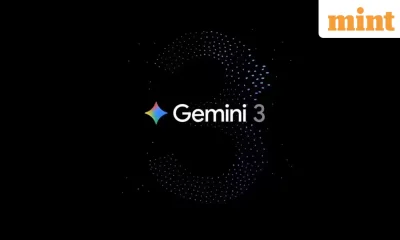
 Technology5 days ago
Technology5 days agoYou’re using Gemini wrong: 7 Viral AI prompts that will instantly transform your presentations – Crypto News
-

 Blockchain5 days ago
Blockchain5 days agoBitcoin Must Break Key Supply Clusters To Regain ATH Momentum – Watch These Levels – Crypto News
-
Business5 days ago
Crypto Exchange Bitget Donates $1.54M To Hong Kong Fire Victims – Crypto News
-

 Cryptocurrency5 days ago
Cryptocurrency5 days agoWhy CoinShares Just Quit the $600M XRP and SOL ETF Battle – Crypto News
-

 Cryptocurrency4 days ago
Cryptocurrency4 days agoCrypto market mixed as Bitcoin tests $93K, Ethereum and XRP hit major resistance – Crypto News
-
Technology1 week ago
Bitcoin Bounces as Jerome Powell Could Push for Another Fed Rate Cut: Barclays Research – Crypto News
-

 Cryptocurrency1 week ago
Cryptocurrency1 week agoXRP bounces back above $2.0 as the $1.9 support holds – Crypto News
-

 Blockchain1 week ago
Blockchain1 week agoSouth Africa’s Central Bank Flags Crypto, Stablecoins as Financial Risk – Crypto News
-

 Cryptocurrency6 days ago
Cryptocurrency6 days agoEthereum’s Vitalik Buterin Drops 256 ETH to Boost Next-Gen Encrypted Messaging – Crypto News
-
Cryptocurrency5 days ago
Bitcoin Price to $100K or $80K as Matrixport Predicts Bulls-Bears Impasse? – Crypto News
-

 Cryptocurrency5 days ago
Cryptocurrency5 days agoADA price forecast: Cardano proposes a 70 million budget for key upgrades – Crypto News
-
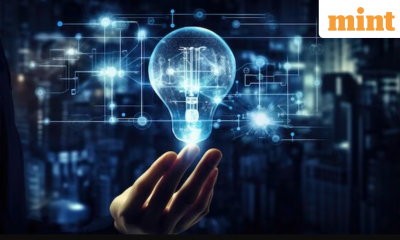
 Technology5 days ago
Technology5 days agoWhat to Stream: George Clooney, Tom Cruise, Zac Brown Band, Michelle Pfeiffer and Metroid Prime 4 – Crypto News

